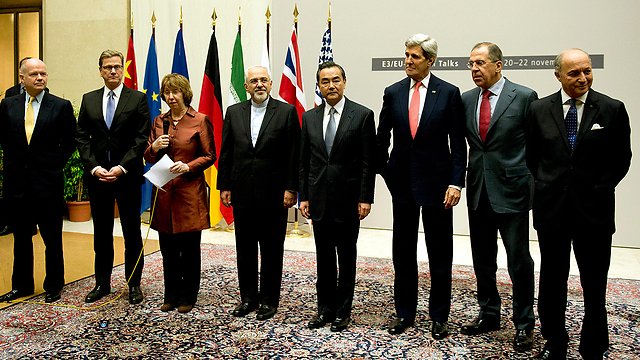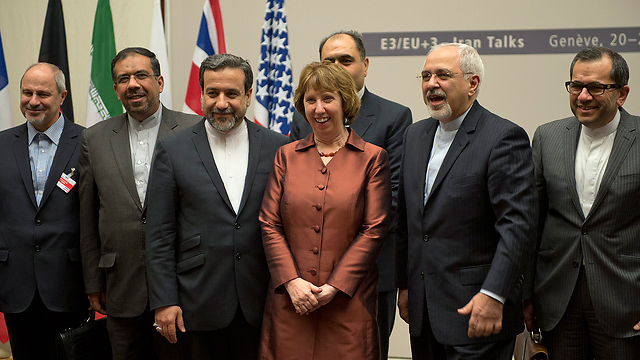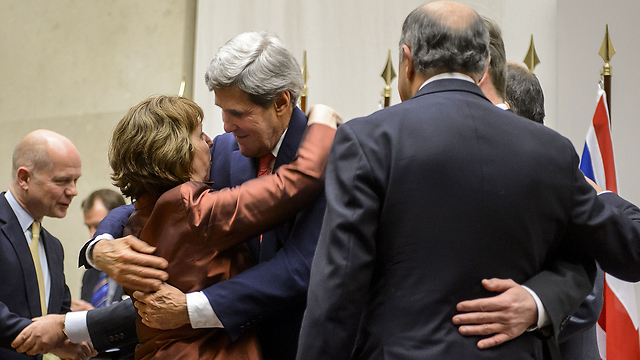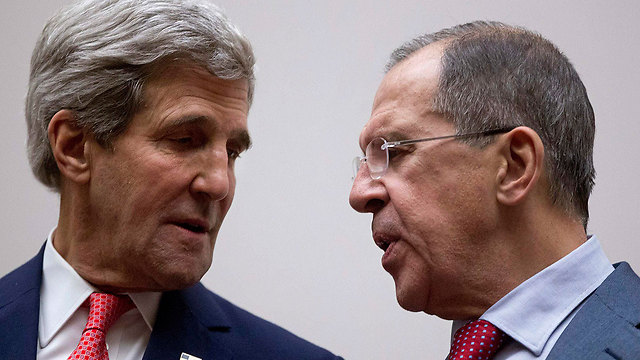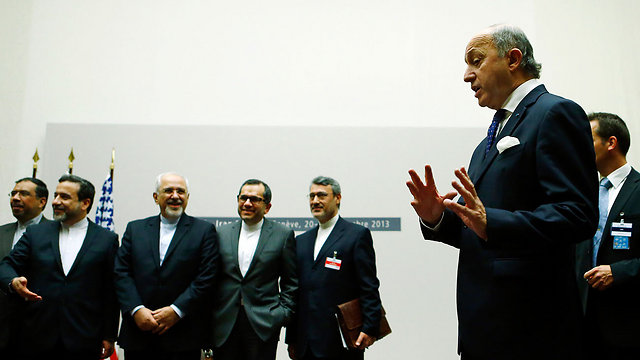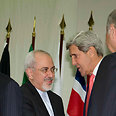
Geneva talks yield nuclear deal with Iran
After months of anticipation, rounds of talks, Iran, world powers reach deal. According to details, Iran will continue low-level enrichment but would neutralize stockpiles. Netanyahu dubs deal 'bad' while Obama claims will block Iran from proliferating
Aimed at ending a dangerous standoff, the agreement between Iran and the United States, France, Germany, Britain, China and Russia was nailed down after more than four days of negotiations in the Swiss city of Geneva, much to the disappointment of Israeli officials.
Related stories:
- Iran says will construct 2 more nuclear power stations
- Iran will not bow to 'excessive demands' in talks
- Kerry arrives in Geneva for talks
The accord was designed as a package of confidence-building steps to ease decades of tensions and confrontation and banish the specter of a Middle East war over Tehran's nuclear aspirations.
European Union foreign policy chief Catherine Ashton, who has been coordinating talks with Iran on behalf of the major powers, said it created time and space for talks aimed at reaching a comprehensive solution to the dispute.
"This is only a first step," Iranian Foreign Minister Mohammad Javad Zarif told a news conference.
"We need to start moving in the direction of restoring confidence, a direction in which we have managed to move against in the past," he said, adding Tehran would expand cooperation with the International Atomic Energy Agency, the UN nuclear watchdog, to address what he called some concerns.
Speaking later Sunday morning in Iran's Press TV, Zarif further claimed that the powers recognized Iran's nuclear program and in a final "step" all sanctions on the Islamic republic would be lifted.
Bad deal
Israeli Prime Minister Benjamin Netanyahu's government denounced the deal Sunday as a "bad deal" that Israel did not regard itself as bound by. "This is a bad deal," an official in Netanyahu's office said.
"Israel does not see itself as bound by this bad, this very bad agreement that has been signed," Economic Minister Naftali Bennett, a member of Netanyahu's security Cabinet, told Israel's Army Radio.
In Washington, President Barack Obama said the deal was an important first step towards a comprehensive solution to Iran's nuclear program and its provisions were key to preventing Iran from proliferating. "Simply put, they cut off Iran's most likely paths to a bomb," Obama told reporters.
A senior US official said the agreement halted progress on Iran's nuclear program, including construction of the Arak research reactor, which is of special concern for the West as it can yield potential bomb material.
Iran has also committed to stop uranium enrichment above a fissile purity of 5%, a US fact sheet said. Refined uranium can be used to fuel nuclear power plants – Iran's stated goal – but also provide the fissile core of an atomic bomb if refined much further.
The deal has no recognition of an Iranian right to enrich uranium and sanctions would still be enforced, the US official added.
Iran will get access to $4.2 billion in foreign exchange as part of the accord, and is also expected to receive limited sanctions relief on gold, petrochemicals and autos, a Western diplomat said.
Intelligence Minister Yuval Steinitz, who is responsible for monitoring Iran's nuclear program, says there is no reason for the world to be celebrating. He says the deal, reached in Geneva early Sunday, is based on "Iranian deception and self-delusion."
It was the first Israeli reaction to the deal. Prime Minister Benjamin Netanyahu was expected to discuss the matter with his Cabinet later Sunday as well as hold a phone conversation with US President Obama.
British Foreign Secretary William Hague said in a Twitter message that it was an "important and encouraging" first-stage agreement with Iran, whose nuclear program "won't move forward for 6 months and parts rolled back."
French Foreign Minister Laurent Fabius said the deal only confirmed Iran's right to civil nuclear power.
"After years of blockages, the agreement in Geneva on Iran's nuclear program is an important step to preserving security and peace," Fabius said in a statement.
US Secretary of State John Kerry and foreign ministers of the five other world powers joined the negotiations with Iran early on Saturday as the two sides appeared to be edging closer to a long-sought preliminary agreement.
Diplomacy was stepped up after the landslide election of Hassan Rohani, a relative moderate, as Iranian president in June, replacing bellicose nationalist Mahmoud Ahmadinejad.
On a Twitter account widely recognized as representing Rohani, a message said after the agreement was announced, "Iranian people's vote for moderation & constructive engagement + tireless efforts by negotiating teams are to open new horizons."
The OPEC producer rejects suspicions it is trying covertly to develop the means to produce nuclear weapons, saying it is stockpiling nuclear material for future atomic power plants.
Lior Zilberstein, Ynet's correspondent in Geneva, AP and Reuters contributed to this report
- Receive Ynetnews updates directly to your desktop










